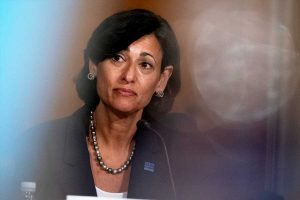Disabled Americans Feel Abandoned by CDC. Now, CDC Is Desperate to Make Amends

On Friday, CDC Director Dr. Rochelle Walensky appeared on Good Morning America, and made a statement that pissed off large swaths of the country: “The overwhelming number of [Covid] deaths — over 75 percent — occurred in people who had at least four comorbidities, so really these are people who were unwell to begin with,” Walensky said. “It’s really encouraging news in the context of Omicron.” Immediately, people with disabilities and comorbidities were furious. By Monday, the CDC knew they had a problem.
According to an email shared exclusively with Rolling Stone, the CDC has tasked Karen Remley, Director for the National Center on Birth Defects and Developmental Disabilities (NCBDDD) at the CDC, with repairing the damage. The email, which was sent to organizations in the disability community, asks for an opportunity to meet and discuss how the organization might help the communities that feel dismissed by them. “I am aware of the concerns that have been circulating around comments made related to Omicron death statistics and comorbidities,” Remley writes. “I would like to connect on a telephone call to discuss this in more detail and to learn more about how CDC, NCBDDD, and I can be of support to you and the audiences we collectively care deeply about.”
Some have dismissed the controversy as overblown, a willful misinterpretation of what she meant — she was referring to a study of vaccinated people and the small number of deaths among them, which was edited out of the version aired by GMA. (“She is deeply concerned and cares about the health and well-being of people with disabilities and those with medical conditions who have been impacted by COVID-19,” a representative told Rolling Stone.) But for disabled and chronically ill people, they finally heard the quiet part out loud. Since the beginning of the pandemic, they’ve been told they’re at the highest risk of dying from Covid. And increasingly, they’re hearing that it’s not worth the effort to protect them.
Maria Town, President and CEO of the American Association of People with Disabilities, remains disheartened by Wallensky’s comments. “[It] highlights the fact that the Director and the CDC view people with disabilities as acceptable losses during the COVID-19 pandemic,” Town tells Rolling Stone. “Her comments, even with the additional context, reveal the systemic and institutional biases against disabled people that determine our lives are inherently worth less.”
When the CDC released its latest Covid isolation guidelines late last month, it marked another disturbing turning point for disabled Americas. The agency shortened the timeline and added a bullet point stating people who were recently infected should, “Avoid people who are immunocompromised or at high risk for severe disease, and nursing homes and other high-risk settings, until at least after 10 days.”
Matthew Cortland, a senior fellow at Data for Progress focusing on disability policy and an attorney, wonders how this would work in the real world. “How on Earth is anyone supposed to know that I am immunocompromised?” Cortland, whose disability isn’t visible, tells Rolling Stone. “Is the CDC going to send me some sort of wearable sandwich board warning people I’m immunocompromised or does CDC expect to make my own?”
Their question belies a fundamental misunderstanding of what it means to be disabled: That it can be seen with the naked eye, or that disabled people can make themselves scarce for the convenience of others. “Are we supposed to just stay in our homes indefinitely so that other people who [are covid positive] and who were told by the CDC they can go back into the world while still infectious” can just get on with their lives?” Cortland asks.
The truth is, advocates say, that dialogue between the disability community and the CDC regarding Covid safety should’ve happened long ago—with the CDC Director herself—before the omicron variant reached the states. According to a 2019 report from the Center for American Progress, disabled adults experience poverty at nearly twice the rate of nondisabled adults: yet disabled people who rely on government assistance to survive have yet to be provided with a single free N-95 mask or a single home testing kit (an idea that was openly mocked by White House Press Secretary Jen Psaki.) Millions of Americans without the money, resources and ability to access tools to mitigate the risk of contracting Covid have been abandoned by the CDC, and with the push to get back to work, there are no signs of that changing.
“My anger at the administration as a high-risk person is founded on a lifetime of institutions and people who do not see my inherent worth whether I can produce or not,” Alice Wong, a disabled activist with a neuromuscular disability who uses a ventilator, tells Rolling Stone. “Who does the CDC serve? Not marginalized communities who predicted the disastrous ways this pandemic would unfold without decisive leadership.”
Source: Read Full Article
